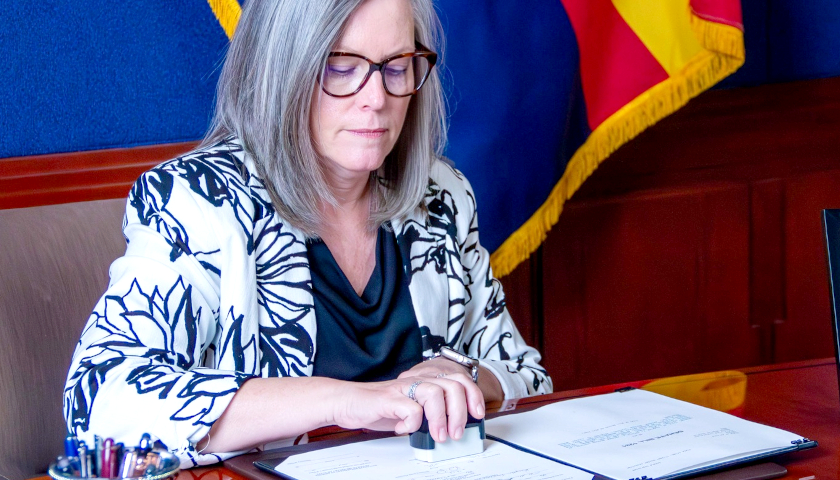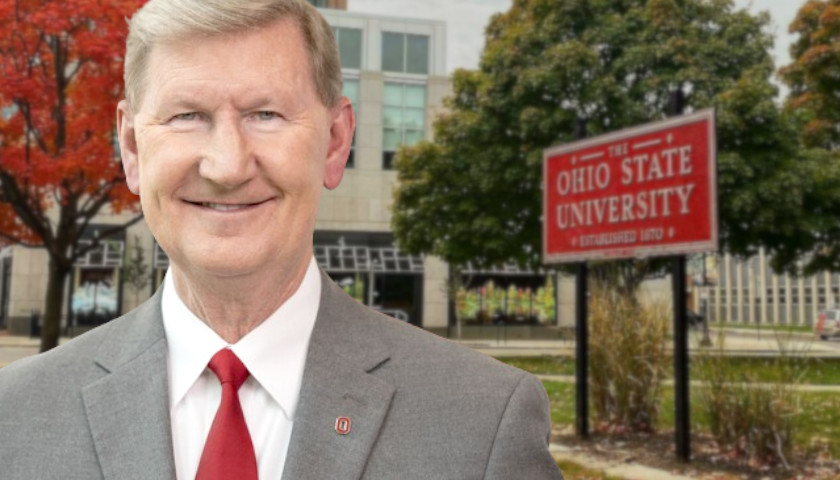by Pedro Gonzalez
Thucydides recalls a scene from the Peloponnesian War when the Athenians, fleeing before their enemies, come to the Assinarus River. They stop to drink from its flowing waters even as their foes bear down on them.
The Syracusans, Thucydides writes, “showered missiles down upon the Athenians, most of them drinking greedily and heaped together in disorder in the hollow of the river.” Then the Peloponnesians “came down and butchered them, especially those in the water which was thus immediately spoiled, but which they went on drinking just the same, mud and all, bloody as it was, most even fighting to have it.”
Greed makes people do stupid, self-destructive things. Even in the face of catastrophe, the avaricious won’t be able to quit. It is an old yet timeless lesson, and one that policymakers in our time seem immune from learning.
Indeed, Republicans are on the Assinarus right now.
Rolling blackouts caused by brutally cold weather have left millions of Texans without electricity. The Lone Star state counts two dozen dead so far.
Democrats have capitalized on the crisis, employing all of the usual talking points about climate change as if Texas’ problems could be solved with more frozen wind turbines dotting the landscape until their unrecyclable blades are laid to rest in landfills.
Meanwhile, Republicans, notably Governor Greg Abbott, have attempted to frame blackouts as entirely the consequence of renewable energy’s failure, omitting that pipelines and equipment at gas wells froze just as solidly as wind turbines. Former Republican Governor Rick Perry wrote in a blog post that “Texans would be without electricity for longer than three days to keep the federal government out of their business.” Death before “regulation” of the Electric Reliability Council of Texas (ERCOT), the state’s privatized power grid, says Perry.
House Minority Leader Kevin McCarthy’s website published Perry’s post, signaling the GOP’s intent to phalanx on this hill. And considering a third of ERCOT’s board of directors—including the two top officeholders—live outside Texas, they’re probably willing to let Texans make that sacrifice on their behalf. Perry presumably will watch from his sprawling home in Round Top overlooking rolling pastures, where he enjoys the “best sunset from our front porch that you could ever imagine.”
Conservative policy organs have also come to the rescue of the GOP.
Chuck DeVore, vice president of the Texas Public Policy Foundation, took a similar line as Abbott. “Blackouts are a feature of the push to have more unreliable renewables on the grid,” he tweeted, adding that energy subsidies are bad, too.
But according to ERCOT Senior Director of System Operations Dan Woodfin, wind shutdowns accounted for less than 13 percent of the outages. “It appears that a lot of the generation that has gone offline today has been primarily due to issues on the natural gas system,” Woodfin said. Compared to renewable sources like wind and solar, nearly twice as many gigawatts went offline due to thermal shutdowns.
Of course, DeVore’s think tank takes in millions from the gas and oil industry—which recently received a $10 billion bailout from the federal government. Among those donors is the Koch Family Foundations, funded by Koch Industries, a conglomerate that until recently owned a natural gas-fired power plant in Odessa, Texas, that became just as useless as fields of frozen renewables.
Katie Tubb at the Heritage Foundation worries that some “are ready to throw Texas’ electricity market design out the door, pointing to soaring prices beyond $9,000 per megawatt-hour, and arguing that Texas’ electricity market doesn’t incentivize generators to build extra capacity for extreme situations like this.”
“But these two go hand in hand,” she writes, “high prices are an important part of the system, sending valuable signals to investors to build more energy infrastructure.”
There is no “straightforward” answer to what went wrong, as the “challenges get deep into the intricate and complex business of balancing the physics and economics of generating, purchasing, and delivering electricity.” But the solution is always remarkably straightforward. “There might be opportunities to more cost-effectively improve reliability and reduce risks of extreme weather events without setting broad weatherization standards,” wonk Nicolas Loris concluded for Heritage.
Things are very complicated now, but it is certain that regulation in the form of weatherization standards to harden Texas’ power grid should be a last resort, Loris writes. The free market must be allowed to hum along uninterrupted, even if that means some Texans who ordinarily pay wholesale prices for their power, as is common, now face electric bills in the thousands of dollars.
“My savings is gone,” Scott Willoughby told the New York Times. At 63-years-old, Willoughby is an Army veteran living on Social Security in Dallas. A $16,752 electric bill wiped out his savings this month. “There’s nothing I can do about it, but it’s broken me.”
Another woman, Katrina Tanner, told the Times about a $6,200 electric bill that was automatically drafted from her account by Griddy, an electricity provider, and left her with just $200 in the bank. Fellow Texan DeAndré Upshaw paid a little more than Tanner, and a lot less than Willoughby, at $6,700. Susan Hosford of Denison, Texas, was automatically charged $1,346.17 by Griddy for the first two weeks of February, which left her bank account overdrawn.
William W. Hogan, a global energy policy professor at Harvard’s Kennedy School, echoes Heritage and TPPF. “As you get closer and closer to the bare minimum, these prices get higher and higher, which is what you want,” he said. Texans complaining about exorbitantly high electric bills, I suppose, should have done the fiscally responsible thing by setting aside their life savings for just such an occasion.
There are two ways to look at what is happening in Texas. As an indictment of the ruling class, or as a freak incident for which no one could have been prepared because it doesn’t happen often. The problem with the latter approach is that it did happen, in Texas, with nearly identical conditions and consequences in 2011.
When extreme cold, a strained power grid, and rolling blackouts afflicted Texas a decade ago, it became evident that the prudent path forward was weatherization. “Not only did federal regulators identify that the state’s energy system was vulnerable to extreme cold,” journalist Zahra Hirji notes, “but even the state’s grid operator and several power suppliers all acknowledged the need for wells, pipelines, and power plants to be better protected from the low temperatures.”
Now into their ninth year of a political trifecta in Texas, the GOP dismissed serious weatherization as needless spending, a distraction from more important things like deregulation for generators. TPPF’s 2011-2012 “Energy Policy for Texas: Affordable & Reliable” report advised lawmakers to “resist [the] temptation to regulate competitive behavior,” to avoid or “eliminate price caps on wholesale and retail electricity markets.” At the moment, a $9,000 market cap prevented prices from running up higher than they otherwise would have.
TPPF also argued against HB 1600, the Public Utility Commission (PUC) Sunset Bill. That bill included a provision allowing the PUC to issue cease-and-desist orders against power companies threatening to shut off power at someone’s home regardless of the consequences.
“Both the emergency cease and desist authority and the broad discretion contained in HB 1600 are completely unjustified given the facts,” TPPF claimed. “This provision in HB 1600 is particularly worrisome at a time when the primary challenge facing state policymakers is maintaining reliability in the face of government intervention in the Texas electricity market.”
Fortunately for Texans, the provision survived a vote and the state has employed it to stop companies from cutting off residents’ power today.
Ironically, TPPF researchers wrote recently that “we can’t forget that we got here through years of adding unreliable power to the grid, reducing the margin of error for mistakes, and undercutting access to reliable energy.”
“From a generator perspective, the only incentive is to bring energy to market as cheaply as possible,” Adrian Shelley told Bloomberg Green. Shelley is the Texas office director of Public Citizen, a consumer advocacy group. “Those sorts of investments aren’t recouped in any other way but by selling energy.”
In other words, while it might be in the public interest to weatherize a power grid, it is not necessarily in the interests of those concerned with bottom lines. It turns out, the market is not a force for “good,” but merely a tool—a means to an end, not an end itself.
Out of ideological fundamentalism and expediency, too many Republicans have come to see the market itself as an end. Thus they abstain—at least when it comes to doing so on behalf of everyday Americans—from intervening through regulations, as Rick Perry did in 2011 as governor. Ironically, it was also around that time that Perry ardently boosted renewable energy.
“No state is more committed to developing renewable sources of energy,” Perry said in August 2009. By “harnessing the energy potential of wind,” he added, “we can provide Texans a form of energy that is green, clean, and easily renewable.” That statement came a month before China announced a $1.5 billion, 36,000-acre wind farm project in western Texas. “The Chinese bank-funded project will even source all 240 turbines from Chinese manufacturer A-Power Energy,” Fast Company reported.
But in his recent blog post, Perry warned that if “wind and solar is (sic) where we’re headed, the last 48 hours ought to give everybody a real pause and go wait a minute.” Further, he wrote, “frozen turbines out in West Texas is a freakish event. But that’s what the government is supposed to think about—what are the freakish events that can occur that could cost people their lives, and to protect against that.” Someone should have reminded Perry of that in 2011 when he also chose, as governor, not to protect against “freakish events” that can cost people their lives.
Former President Donald Trump did something similar with renewable energy—at once railing against wind turbines and then allowing a Chinese-owned company to build a wind farm in Texas near Laughlin Air Force Base, the largest pilot training facility in the service. “Why this location and why this project?” former Republican Representative Will Hurd said to Foreign Policy. Hurd represented a district within the boundaries of the project. “Why are we allowing a Chinese company to do that in the U.S.? A former U.S. general would not be able to do this kind of project in China.”
Trump campaigned as a populist but ended up more or less a Republican in the style of Perry. Just as the GOP in Texas dismissed infrastructure investment after the 2011 storm in favor of deregulation, Trump’s infrastructure plan—his most popular campaign promise—took a backseat to tax cuts.
But Hurd’s question is worthy of closer consideration. Ostensibly, one man’s dollar is just as good as another’s in the free market. But that’s not really true. Big money, even when it’s Chinese, is more important than what native Texans need. The dollars of donors in the gas and oil industry carry more weight than those of taxpayers. In a similar vein, Greg Abbott welcomes Amazon into Texas, although the company is hostile to everything many Texan taxpayers cherish because some dollars do indeed matter more than others.
It’s complicated; there are a lot of moving parts, infrastructure investment isn’t cheap, you can’t just print money—unless you’re “too big to fail,” in which case bailouts and subsidies fall like manna from heaven.
What happened in Texas resembles an economic bubble bursting. Years of deregulation, paying people to look the other way, buying cover from think tanks, warning signs that go unheeded—and pop! In the end, it’s everyday Americans getting stuck with the bill. Regulation is always the last resort, never the definite answer, unless it’s the odd incident where average Joes screw Wall Street, as the GameStop fiasco showed.
In this respect, what happened in Texas isn’t all that strange. “Electric generators in ERCOT are not public servants,” writes Marcus Pridgeon, a former general manager of the Guadalupe Valley Electric Cooperative. “They are primarily private companies with the interests of shareholders and creditors at heart, and that is the basis for their decisions. It is the free market.”
Pridgeon concludes, sarcastically, that upset Americans ought to know “the culprit is the competitive energy market that has created the low prices Texans have enjoyed the last two decades.” And lenders were the good guys in the subprime mortgage crisis, just as hedge funds and short-sellers are the good guys in the GameStop story.
Though blackouts in Texas put the ball in their court, Republicans aren’t the only culprits in this debacle or in the general pattern of shilling for corporate interests. Democrats, arguably, are even worse corporate shills in our time, they’re just a little bit more clever about their scams. In other words, Democrats are not as stupid as the members of the Stupid Party and their policy organs don’t wear their greed on their sleeves, imagining they can sell it as a virtue.
The street-level view is a freak storm knocking out the power for a few million unlucky Texans. But the bigger picture comes into view as an indictment of a bought, unresponsive ruling class, weaseling its way from one bubble to the next, letting everyday Americans socialize the cost one way or another.
– – –
Pedro Gonzalez is assistant editor of American Greatness and a Mount Vernon Fellow of the Center for American Greatness. Follow him on Twitter @emeriticus.





